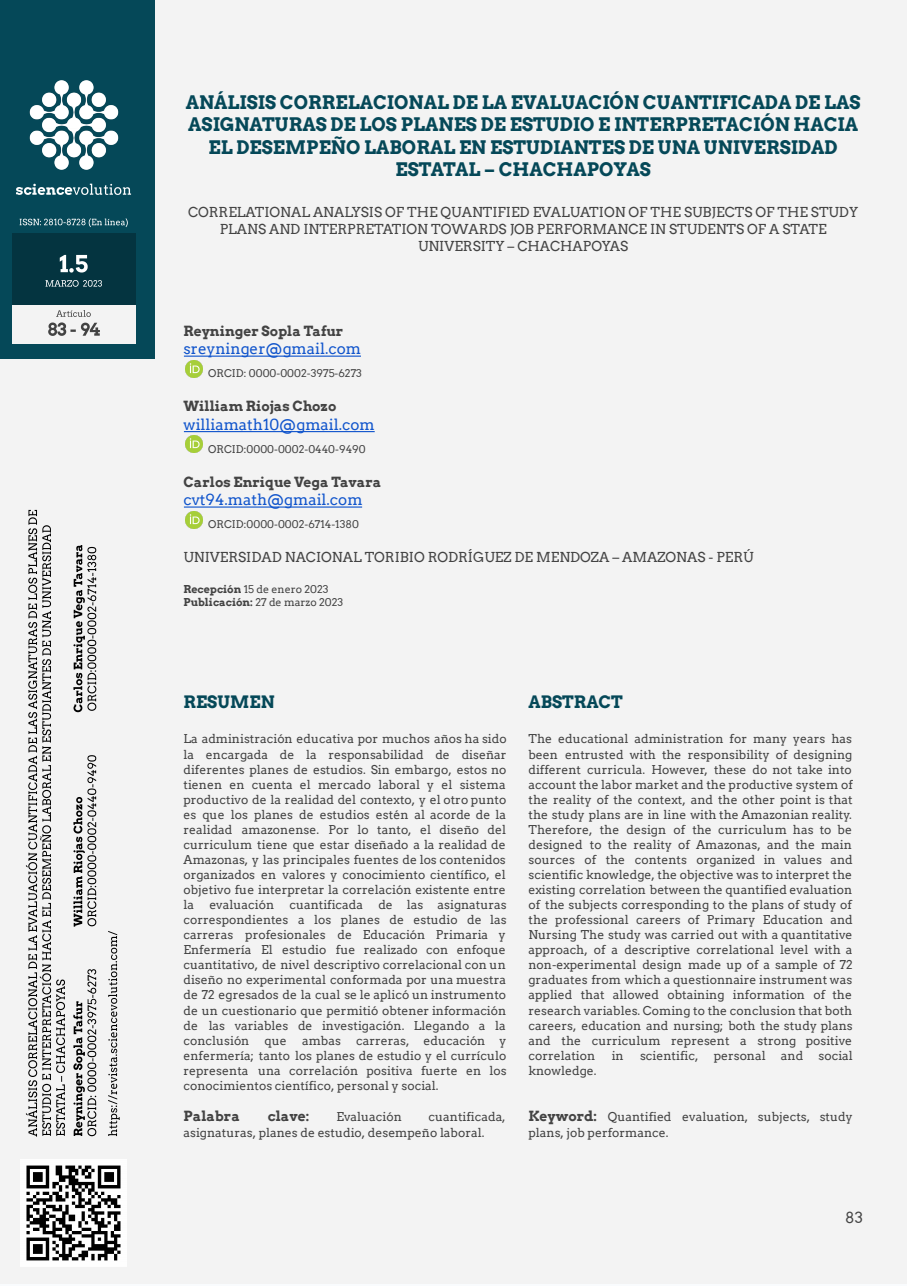Abstract
The educational administration for many years has been entrusted with the responsibility of designing different curricula. However, these do not take into account the labor market and the productive system of the reality of the context, and the other point is that the study plans are in line with the Amazonian reality. Therefore, the design of the curriculum has to be designed to the reality of Amazonas, and the main sources of the contents organized in values and scientific knowledge, the objective was to interpret the existing correlation between the quantified evaluation of the subjects corresponding to the plans of study of the professional careers of Primary Education and Nursing The study was carried out with a quantitative approach, of a descriptive correlational level with a non-experimental design made up of a sample of 72 graduates from which a questionnaire instrument was applied that allowed obtaining information of the research variables. Coming to the conclusion that both careers, education and nursing; both the study plans and the curriculum represent a strong positive correlation in scientific, personal and social knowledge.
References
Baltodano. V. (2019) Lecciones de filosofía contemporánea. Trujillo: Ed. Libertad.
Buitrón Z., E. (2020) Principios de didáctica general y de didáctica universitaria. Huánuco: Edit.
Bunge, M. (2020) Crisis y reconstrucción de la filosofía. Argentina: Edit. Gedisa.
Goleman, D. (2017) La inteligencia emocional. Buenos Aires: Edit. VERLAP SA.
Gardner, H. (2017) Las inteligencias múltiples. 3ª Ed. Santa Fe de Bogotá: Fondo de Cultura Económica
Greemberg, E. (2018) Minimiun variante properties of principal component regression. J. Am. Stat. Assoc.
Henriquez, W. (2018) Análisis de calificaciones por componentes principales, Tesis de Maestría, Postgrado en Estadística, Universidad Central de Venezuela, Maracay, Venezuela.
Hernandez Sampieri, R. (2017) Metodología de la investigación. Tercera Edición. México: Edit. Mc Graw-Hill/Interamericana Editores. S.A.
Labarrere, G. y Valdivia, G. (2020) Pedagogía. La Habana: Editorial Pueblo y Educación.
Lazo, J. (2020) Pedagogía Universitaria. Perú: Edit. Universidad Alas Peruanas.
Matori, J. (2018) Análisis estadístico con SPSS para WINDOWS. Volumen II. Estadística Multivariante. Segunda Edición. Edit. Mc Graw Hill.
OCÉANO CENTRUM. (2018) Enciclopedia psicopedagógica. Pedagogía y psicología. Barcelona: Océano Grupo Editorial.
Roeders, P. (2017) Aprendiendo juntos. Un diseño del aprendizaje activo. Lima: Walkiria Ediciones.
PLA, E. L. (2018) Análisis multivariado: Método de componentes principales. Editora Eva V. Chesneau. Washington, D.C.: OEA. Programa Regional de Desarrollo Científico y Tecnológico.
Terrádez, G. (2018) Análisis de componentes principales. Proyecto e-Math. Financiado por la Secretaría de Estado de Educación y Universidades (MECD).
Visuata, B. y Martori, J. (2017) Análisis estadístico con SPSS para Windows. Estadística Multivariante. Volumen II. Segunda Edición. España: Edit. McGraw Hill.

This work is licensed under a Creative Commons Attribution-NonCommercial-NoDerivatives 4.0 International License.
Copyright (c) 2023 http://revista.sciencevolution.com/

